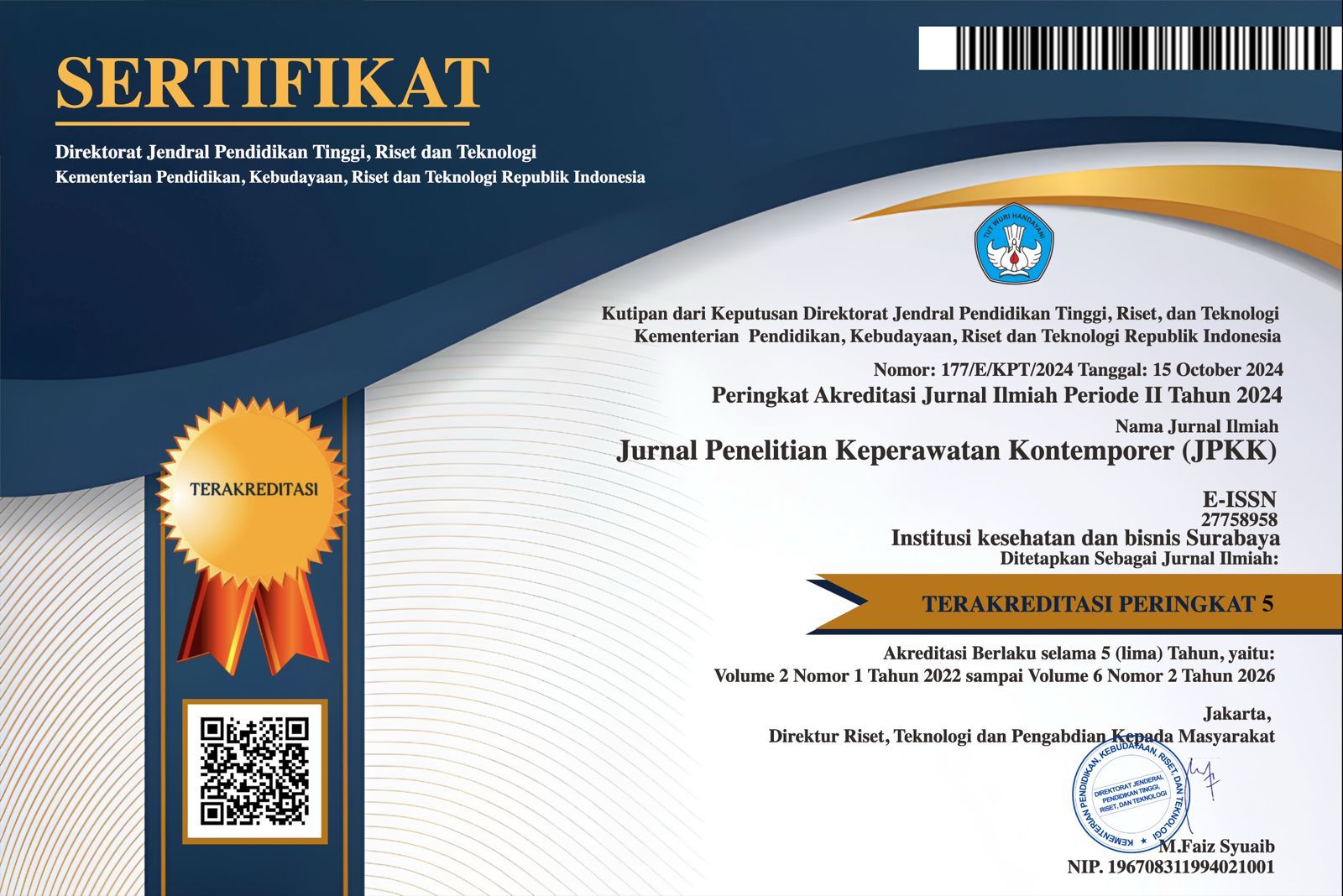The Correlation Of Education And Income Level Relations Family With The Utilization Of Health Services
HUBUNGAN TINGKAT PENDIDIKAN DAN PENDAPATAN KELUARGA DENGAN PEMANFAATAN PELAYANAN KESEHATAN
DOI:
https://doi.org/10.59894/jpkk.v5i1.925Keywords:
education level, family income, service utilizationAbstract
Background: Puskesmas is a health service facility that organizes public health efforts and first-level individual health efforts by prioritizing promotive and preventive efforts to achieve the highest degree of health in its working area. Public health efforts include essential public health efforts and development health efforts. Efforts to consider health service needs. Objective: To determine the relationship between education level and family income with health service utilization. Methods: This research is correlational analytic with a cross sectional approach. The population in this study were 200 people, the number of samples in this study amounted to 133 respondents with the Random Sampling technique. The results of the study were tested with the Kendall tau statistical test with a significance of α = <0.05 with the SPSS 25 program. This research was conducted at the Cimandala Health Center, Bogor Regency. Results: Based on the results of the study obtained a p value of 0.000 <0.05, which means that there is a relationship between education level and utilization of health services at the Cimandala Health Center, Bogor Regency (Ho is rejected and Ha is accepted). And the results of the study also obtained a p value of 0.437> 0.05 which means that there is no relationship between the level of education on the utilization of health services at the Cimandala Health Center, Bogor Regency (Ho is accepted and Ha is rejected). Conclusion: The results of this study can provide an overview of the level of education and family income on the utilization of health services at the Cimandala Health Center, so that it can be a reference for improving good performance in the quality of service.
References
Aditama, T.Y. (2016). Manajemen Administrasi Rumah Sakit, edisi kedua. Universitas Indonesia. Jakarta [Preprint].
Aryawati, N.P.A. et al. (2023). Manajemen Keuangan. Penerbit Tahta Media. p. 121. Available at: https://tahtamedia.co.id/index.php/issj/article/view/109.
Asri, A. (2022). Faktor - Faktor Yang Berhubungan Dengan Pemanfaatan Pelayanan Kesehatan Pada Peserta Bpjs Kesehatan Di Puskesmas Campalagian. Journal Peqguruang: Conference Series. 4(1), p. 82. Available at: https://doi.org/10.35329/jp.v4i1.2864.
Dinkes Jabar. (2022). Profil Kesehatan Jawa Barat Tahun 2021. Dinas kesehatan Jawa Barat.
Hendra, H. et al. (2023). Konsep Manajemen Pendidikan Di Indonesia. Jurnal Cakrawala Ilmiah. 2(5). pp. 1783–1790. Available at: https://doi.org/10.53625/jcijurnalcakrawalailmiah.v2i5.4594.
Husnaniyah, D., Yulyanti, D. and Rudiansyah, R. (2020). Hubungan Tingkat Pendidikan Ibu dengan Kejadian Stunting. The Indonesian Journal of Health Science. 12(1). pp. 57–64. Available at: https://doi.org/10.32528/ijhs.v12i1.4857.
Kementrian RI. (2014). Peraturan Menteri Kesehatan Republik Indonesia Nomor 75 Tahun 2014. Applied Microbiology and Biotechnology. 85(1). pp. 2071–2079. Available at: https://doi.org/10.1016/j.bbapap.2013.06.007.
Mahmud. (2017). Psikologi Pendidikan. Bandung: Pustaka Setia [Preprint].
Ningsih, I.W., Mayasari, A. and Ruswandi, U. (2022). Konsep Pendidikan Multikultural di Indonesia. Edumaspul: Jurnal Pendidikan. 6(1). pp. 1083–1091. Available at: https://doi.org/10.33487/edumaspul.v6i1.3391.
Notoatmodjo, D.S.P. (2014). Promosi Kesehatan Dan Perilaku Kesehatan. in, p. 17–27 P.
Nurmadiah, N. and Asmariani, A. (2019). Teknologi Pendidikan. Al-Afkar : Manajemen pendidikan Islam. 7(1). pp. 61–90. Available at: https://doi.org/10.32520/afkar.v7i1.220.
Nurrohmah, M. (2021). Besarnya pendapatan keluarga dengan pemanfaatan pelayanan kesehatan. IIK STRADA Indonesia. pp. 1–7.
Purba, H.L.K., Jati, S.P. and Kusumastuti, W. (2022). Hubungan Faktor Pemungkin, Pendukung, dan Kebutuhan Dalam Pemanfaatan Pelayanan Kesehatan Di Puskesmas Martoba Selama Pandemi Covid-19. Media Kesehatan Masyarakat Indonesia. 21(4). pp. 217–223. Available at: https://doi.org/10.14710/mkmi.21.4.217-223.
Rani Devayanti, Eni Rizki, Yufi A, Fajar Adhie, Elpinaria G, Tisna Yanti, Tri Diani, Dewi A, Siti M, S.Y. (2024). Kepuasan Pasien Pengguna Bpjs Terhadap Kualitas Pelayanan Kesehatan. Journal of Scientech Research and Development. 6(1). pp. 111–118.
Riskesdas (2018). Riskesdas (2018). Hasil Utama Riset Kesehatan Dasar Tahun 2018. Kementrian Kesehatan Republik Indonesia.’
Safira, A.M. and Candrasari, A. (2021). Pengaruh Fungsi Keluarga dan Pendapatan Keluarga terhadap Tingkat Kecemasan Remaja di Era Pandemi Covid-19.
Ulfira, L., Lastri, S. and Andria, D. (2023). Faktor Yang Berhubungan Dengan Pemanfaatan Bpjs Kesehatan Pada Masyarakat Di Puskesmas Alue Pisang Kabupaten Aceh Barat Daya Tahun 2022. Jurnal Kesehatan Tambusai. 4(4). pp. 6058–6065. Available at: https://doi.org/10.31004/jkt.v4i4.21512.
Widiyastuty, F., Suryawati, C. and Arso, S.P. (2023). Pemanfaatan Pelayanan Puskesmas oleh Masyarakat di Daerah Perbatasan Kecamatan Entikong. Jurnal Manajemen Kesehatan Indonesia. 11(1), pp. 64–78. Available at: https://doi.org/10.14710/jmki.11.1.2023.64-78.
Zulkarnain Ilyas Idris (2020). Pengaruh Pendapatan, Pendidikan, Dan Biaya Terhadap Permintaan Pelayanan Kesehatan Di Kota Gorontalo. Mala’bi: Jurnal Manajemen Ekonomi STIE Yapman Majene. 2(2). pp. 126–143. Available at: https://doi.org/10.47824/jme.v2i2.58.
Downloads
Published
How to Cite
Issue
Section
License
Copyright (c) 2025 Sasni Triana Putri, Deden Nurjaman, Benny MP, Julianto Laia, Irianto Honest, Yunita, Rizka, Eni Rizki, Fajar Adhie, Nining Fitrianingsih

This work is licensed under a Creative Commons Attribution 4.0 International License.
All articles published by Jurnal Penelitian Keperawatan Kontemporer (JPKK), the authors hold the copyright under license Creative Commons Attribution License.











